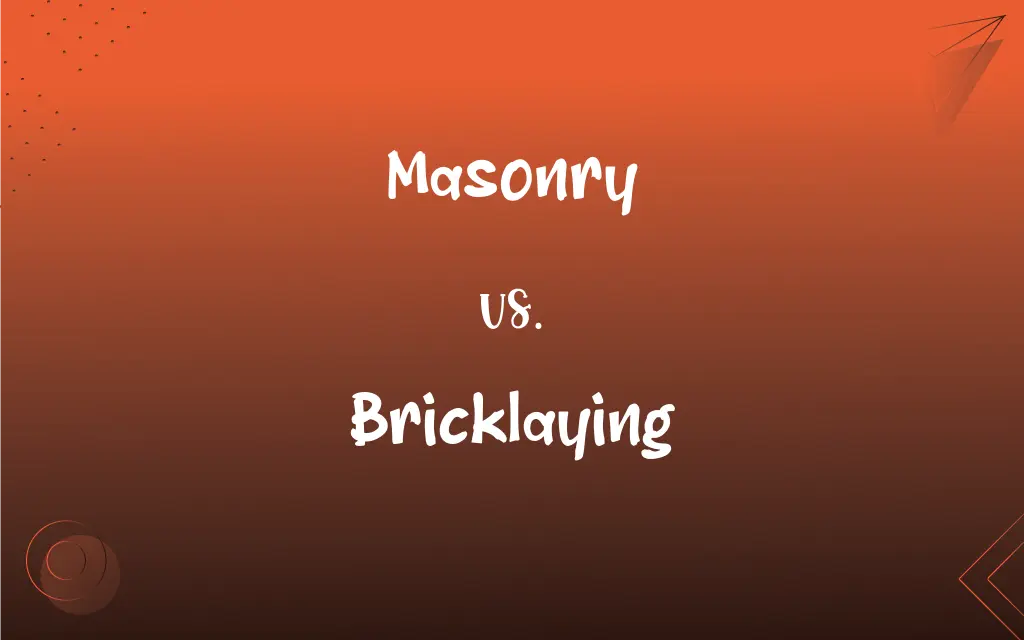Masonry vs. Bricklaying: What's the Difference?
Edited by Harlon Moss || By Janet White || Updated on October 26, 2023
"Masonry" refers to constructing structures using individual units bound together by mortar, while "Bricklaying" is specifically laying bricks using mortar.

Key Differences
"Masonry" and "Bricklaying" are both important terms in the construction industry, but they convey different meanings. Masonry encompasses a broader range of materials and techniques, including stones, bricks, concrete blocks, and more. It's a term that speaks to the art and science of building structures using individual units. In contrast, Bricklaying is a subset of masonry, specifically referring to the act of laying bricks in a pattern and securing them with mortar.
The foundations of masonry can be traced back to ancient civilizations, where different types of stones and bonding agents were used to create lasting structures. On the other hand, Bricklaying, as the name suggests, revolves around bricks. Bricks have been a favorite in construction due to their uniform size, shape, and durability, making bricklaying an integral part of masonry.
To understand the distinction further, consider a mason as someone who is skilled in working with various construction units, such as stones, bricks, or cinder blocks. Their expertise isn't limited to one material. A bricklayer, however, specializes exclusively in working with bricks. While all bricklayers are masons, not all masons are bricklayers.
In practical scenarios, masonry offers diverse aesthetic and structural possibilities due to its wide range of materials. Projects could involve stone walls, brick patios, or concrete block buildings. Bricklaying, being more specific, is largely seen in projects where the aesthetics and characteristics of bricks are preferred.
Comparison Chart
Definition
Building structures using individual units with mortar.
Specifically laying bricks with mortar.
ADVERTISEMENT
Scope
Broad, includes various materials.
Narrow, focused on bricks.
Materials Used
Bricks, stones, concrete blocks, etc.
Bricks only.
Specialization
General construction with various units.
Specialized construction with bricks.
End Products
Walls, buildings, monuments, etc.
Brick walls, chimneys, and other brick structures.
Masonry and Bricklaying Definitions
Masonry
A structure built from stone, brick, or concrete blocks.
The masonry wall stood strong against the storm.
ADVERTISEMENT
Bricklaying
Erecting structures or walls using bricks.
The garden wall involved two days of bricklaying.
Masonry
The art of building using individual units like stones or bricks bound with mortar.
Ancient masonry techniques are still admired today.
Bricklaying
The occupation of a person who lays bricks.
He took up bricklaying as a profession.
Masonry
The profession of a mason.
He learned masonry from his grandfather.
Bricklaying
Construction work involving bricks and mortar.
The new house involved extensive bricklaying.
Masonry
The trade of a mason.
Bricklaying
The act of laying bricks using mortar.
Bricklaying requires precision and patience.
Masonry
Work done by a mason.
Bricklaying
The skill or craft of building with bricks.
Bricklaying is taught in many vocational schools.
Masonry
Stonework or brickwork.
Bricklaying
One who builds with bricks.
Masonry
Masonry Freemasonry.
Bricklaying
The act of building a wall by laying bricks, usually with cement between the surfaces of the bricks.
Masonry
The art or occupation of a mason.
He studied masonry for five years.
Bricklaying
The art of building with bricks, or of uniting them by cement or mortar into various forms; the act or occupation of laying bricks.
Masonry
The work or performance of a mason
The masonry was exquisite.
Bricklaying
The craft of laying bricks
Masonry
That which is built by a mason; anything constructed of the materials used by masons, such as stone, brick, tiles, or the like. Dry masonry is applied to structures made without mortar.
The masonry was cracked.
Masonry
The craft, institution, or mysteries of Freemasons; Freemasonry.
Masonry
The art or occupation of a mason.
Masonry
The work or performance of a mason; as, good or bad masonry; skillful masonry.
Masonry
That which is built by a mason; anything constructed of the materials used by masons, such as stone, brick, tiles, or the like. Dry masonry is applied to structures made without mortar.
Masonry
The craft, institution, or mysteries of Freemasons; freemasonry.
Masonry
Structure built of stone or brick by a mason
Masonry
Freemasons collectively
Masonry
The craft of a mason
Masonry
The work or structures produced by a mason.
The town square boasts intricate masonry from centuries past.
Masonry
Building practices using mortar to bind construction units.
Masonry techniques vary based on the materials used.
FAQs
Which is older, masonry or bricklaying?
Masonry, as it includes a variety of materials, predates bricklaying.
Can a mason perform bricklaying?
Yes, a mason can perform bricklaying, but not all masonry involves bricks.
Is bricklaying exclusive to bricks?
Yes, bricklaying specifically involves the laying of bricks.
Are masonry and bricklaying the same?
No, masonry is broader, while bricklaying specifically involves laying bricks.
Can masonry involve materials other than bricks?
Yes, masonry can involve stones, concrete blocks, and more.
Is bricklaying considered a specialized skill?
Yes, bricklaying is a specialized subset of masonry.
Are all bricklayers also masons?
Yes, all bricklayers are masons, but not all masons are bricklayers.
Can masonry involve modern materials?
Yes, masonry can involve modern materials like concrete blocks.
What's an advantage of masonry over other construction?
Masonry structures can be highly durable and resistant to fire.
Why might someone choose masonry for a project?
Masonry offers diverse aesthetic and structural possibilities due to varied materials.
Which is more durable, masonry or bricklaying?
Both can be durable, but it depends on the quality of materials and workmanship.
Why might someone prefer bricklaying over other masonry?
Bricklaying offers uniformity and specific aesthetic characteristics of bricks.
Is masonry limited to outdoor structures?
No, masonry can be used for both exterior and interior structures.
Do masonry and bricklaying require different tools?
While there's overlap, bricklaying may require more specific tools for brick handling.
Is bricklaying more costly than other masonry?
Costs vary, but bricklaying can be more labor-intensive due to brick precision.
Is learning bricklaying a long process?
While basics can be learned quickly, mastery takes time and experience.
How long has masonry been practiced?
Masonry has ancient origins, dating back thousands of years.
Are bricks the most common material in masonry?
Bricks are common, but masonry also includes stones, concrete blocks, and more.
Can bricklaying be decorative?
Yes, bricklaying can be both functional and decorative, with various patterns.
How are masonry and bricklaying related to architecture?
Both are integral to architectural design, influencing aesthetics and structural integrity.
About Author
Written by
Janet WhiteJanet White has been an esteemed writer and blogger for Difference Wiki. Holding a Master's degree in Science and Medical Journalism from the prestigious Boston University, she has consistently demonstrated her expertise and passion for her field. When she's not immersed in her work, Janet relishes her time exercising, delving into a good book, and cherishing moments with friends and family.
Edited by
Harlon MossHarlon is a seasoned quality moderator and accomplished content writer for Difference Wiki. An alumnus of the prestigious University of California, he earned his degree in Computer Science. Leveraging his academic background, Harlon brings a meticulous and informed perspective to his work, ensuring content accuracy and excellence.































































